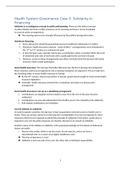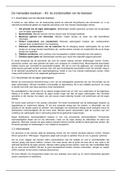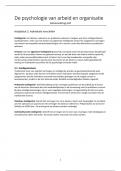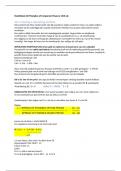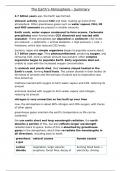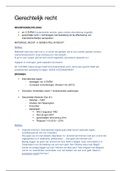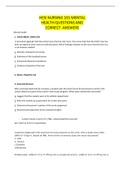Health System Governance Case 5: Solidarity in
Financing
Solidarity is an ambiguous concept in public policymaking. Many use this ethical concept
in policy debates but there is little consensus on its meaning and how it can be translated
in concrete policy arrangements.
The meaning seems to be strongly influenced by the political perspective taken.
Healthcare financing:
Every sick person should be guaranteed access to healthcare (otherwise it is unfair)
Therefore, health insurance schemes ‘’avant la lettre’’ (arrangements) were introduced in
the 17th to 19th century as a common risk pool
In this risk pool, every member had to pay a contribution: when a member fell ill, the costs
of treatment and costs of sick leave were usually paid by the common risk pool
However, access to these arrangements was often restricted (only few persons with some
entrance criteria could participate)
Social health insurance: The German Chancellor Bismarck was the first in Europe who integrated
these voluntary and local arrangements into a national mandatory arrangement. This act made him
the founding father of social health insurance in Europe
By the 20th century, almost everywhere in Europe, governments sought to enact social health
insurance legislation
Gradually, health insurance evolved into a mandatory and state-run bureaucratic
arrangement
Social health insurance is set up as a subsidizing arrangement.
1. Contributions are (largely) income-related (=costs from the rich to the poor (income
solidarity)).
2. Contributions are also risk-independent (the healthy pay for the unhealthy (risk solidarity).
3. Risk-related contributions are forbidden
Current debates on solidarity:
In many European countries, the big issue is how to guarantee universal access to health care in
future. There are serious concerns on the long-term sustainability of current arrangements. Hard
measures (reforms) are required to uphold the principle of solidarity in the future, particularly in
long-term care, but the policy measures are heavily criticized as an assault on solidarity.
Another reason of the debate on solidarity is the growing knowledge on the impact of behavioral
factors on health.
o Persons who smoke, drink or eat too much, do not exercise, and so on have a
risky lifestyle and, as a result, incur higher healthcare costs.
The time of ignorance is over!
Solidarity is only one side of the coin: the other side is individual responsibility.
1
, Lecture 1: Distributive Justice in Healthcare: 5 perspectives
Healthcare governance is all about distribution:
How to make choices about the distribution of scarce resources? (e.g. hospital beds,
medicine, vaccination, organs for transplantation and man power)
How to substantiate these choices? (policymakers have to have good reasons for this)
A key issue in healthcare is financing provisions:
1. Is healthcare a market commodity? (e.g. some might not have access)
2. Who should pay?
3. How much should be paid?
4. Are schemes based on ability-to-pay fair? (e.g. rich people pay more than poor people)
5. Are risk-related payment schemes fair? (e.g. smokers pay more than non-smokers)
6. Who should live and die? (e.g. populations at risk, dividing organs is such a decision)
These are questions about fairness
So these choices and substantiations are never only about ‘’the numbers’’ but they are
entangled with ethics and political ideologies (‘’fairness’’)
Distributive Justice (DJ): how to distribute fairly (5 major perspectives):
It is ‘’an ongoing scholarly conversation on the fair distribution of goods’’
Ethics and political philosophy play an important role in fairness/justice
Ethics: discipline that studies what is good and how should we act in a good way
Political philosophy: how should we organise society to make sure that it is good and what kind of
institutions do we need for a just society?
If everyone had all the things they needed, there was no problem
So there is a problem of scarcity
Goods: resources (e.g. water & food), provisions (e.g. education and healthcare) and services
(e.g. social housing)
How to divide this: is it okay if some people get a bigger ‘’slice’’ of the cake, how big should
it be or if some people do not get a ‘’slice’’ at all?
This is relevant for (future) healthcare policy makers and managers because:
o It provides grounds for making and substantiating choices
o It helps identify and understand typical positions
Bioethics: discipline that deals with normative questions about ‘’the good’’ in health, medicine and
life sciences
-Normativity: how should we act to make sure that the good happens
Principles for ‘’good practice’’ (e.g. respect for autonomy, beneficence/heal people, non-
maleficence/not harm people)
These principles provide guidelines for clinical decision-making
Modern medicine: there is a lot of scarcity of goods (e.g. dialysis, transplantation)
Therefore, there is a new direction in bioethics: justice in health care is also considered more
o Tom Beauchamp (1979): wrote the Belmont Report in which he posed questions about
the justice in modern medicine and provided some criteria for ‘’justice’’
2
Financing
Solidarity is an ambiguous concept in public policymaking. Many use this ethical concept
in policy debates but there is little consensus on its meaning and how it can be translated
in concrete policy arrangements.
The meaning seems to be strongly influenced by the political perspective taken.
Healthcare financing:
Every sick person should be guaranteed access to healthcare (otherwise it is unfair)
Therefore, health insurance schemes ‘’avant la lettre’’ (arrangements) were introduced in
the 17th to 19th century as a common risk pool
In this risk pool, every member had to pay a contribution: when a member fell ill, the costs
of treatment and costs of sick leave were usually paid by the common risk pool
However, access to these arrangements was often restricted (only few persons with some
entrance criteria could participate)
Social health insurance: The German Chancellor Bismarck was the first in Europe who integrated
these voluntary and local arrangements into a national mandatory arrangement. This act made him
the founding father of social health insurance in Europe
By the 20th century, almost everywhere in Europe, governments sought to enact social health
insurance legislation
Gradually, health insurance evolved into a mandatory and state-run bureaucratic
arrangement
Social health insurance is set up as a subsidizing arrangement.
1. Contributions are (largely) income-related (=costs from the rich to the poor (income
solidarity)).
2. Contributions are also risk-independent (the healthy pay for the unhealthy (risk solidarity).
3. Risk-related contributions are forbidden
Current debates on solidarity:
In many European countries, the big issue is how to guarantee universal access to health care in
future. There are serious concerns on the long-term sustainability of current arrangements. Hard
measures (reforms) are required to uphold the principle of solidarity in the future, particularly in
long-term care, but the policy measures are heavily criticized as an assault on solidarity.
Another reason of the debate on solidarity is the growing knowledge on the impact of behavioral
factors on health.
o Persons who smoke, drink or eat too much, do not exercise, and so on have a
risky lifestyle and, as a result, incur higher healthcare costs.
The time of ignorance is over!
Solidarity is only one side of the coin: the other side is individual responsibility.
1
, Lecture 1: Distributive Justice in Healthcare: 5 perspectives
Healthcare governance is all about distribution:
How to make choices about the distribution of scarce resources? (e.g. hospital beds,
medicine, vaccination, organs for transplantation and man power)
How to substantiate these choices? (policymakers have to have good reasons for this)
A key issue in healthcare is financing provisions:
1. Is healthcare a market commodity? (e.g. some might not have access)
2. Who should pay?
3. How much should be paid?
4. Are schemes based on ability-to-pay fair? (e.g. rich people pay more than poor people)
5. Are risk-related payment schemes fair? (e.g. smokers pay more than non-smokers)
6. Who should live and die? (e.g. populations at risk, dividing organs is such a decision)
These are questions about fairness
So these choices and substantiations are never only about ‘’the numbers’’ but they are
entangled with ethics and political ideologies (‘’fairness’’)
Distributive Justice (DJ): how to distribute fairly (5 major perspectives):
It is ‘’an ongoing scholarly conversation on the fair distribution of goods’’
Ethics and political philosophy play an important role in fairness/justice
Ethics: discipline that studies what is good and how should we act in a good way
Political philosophy: how should we organise society to make sure that it is good and what kind of
institutions do we need for a just society?
If everyone had all the things they needed, there was no problem
So there is a problem of scarcity
Goods: resources (e.g. water & food), provisions (e.g. education and healthcare) and services
(e.g. social housing)
How to divide this: is it okay if some people get a bigger ‘’slice’’ of the cake, how big should
it be or if some people do not get a ‘’slice’’ at all?
This is relevant for (future) healthcare policy makers and managers because:
o It provides grounds for making and substantiating choices
o It helps identify and understand typical positions
Bioethics: discipline that deals with normative questions about ‘’the good’’ in health, medicine and
life sciences
-Normativity: how should we act to make sure that the good happens
Principles for ‘’good practice’’ (e.g. respect for autonomy, beneficence/heal people, non-
maleficence/not harm people)
These principles provide guidelines for clinical decision-making
Modern medicine: there is a lot of scarcity of goods (e.g. dialysis, transplantation)
Therefore, there is a new direction in bioethics: justice in health care is also considered more
o Tom Beauchamp (1979): wrote the Belmont Report in which he posed questions about
the justice in modern medicine and provided some criteria for ‘’justice’’
2


